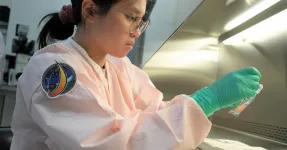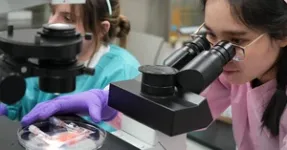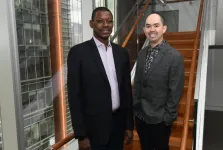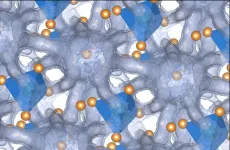(Press-News.org) On May 21, 2023, scientists at University of California San Diego Sanford Stem Cell Institute launched several new nanobioreactor experiments onto the International Space Station (ISS) via the second Axiom Space Private Astronaut Mission, Axiom Mission 2 (Ax-2). The latest experiments expand their research on human stem cell aging, inflammation and cancer in low Earth orbit.
Increasing evidence shows that microgravity conditions can accelerate aging, inflammation and immune dysfunction in human stem cells. Understanding this process is not only helpful for keeping astronauts healthy — it could also teach us how to better treat cancer on Earth.
During Axiom Space’s first Private Astronaut Mission, Axiom Mission 1 (Ax-1), the researchers discovered that in low Earth orbit, cancer stem cells appeared to regenerate more easily and become more resistant to standard therapies. The Ax-2 mission will now determine if two inhibitory drugs can reverse the regeneration in an organoid model of breast cancer. Another line of experiments will track the health of astronauts’ blood stem cells before, during and after spaceflight to evaluate the effects of the space environment on stem cell aging, immune function and cancer stem cell generation.
These projects are part of the NASA-funded Integrated Space Stem Cell Orbital Research (ISSCOR) Center, a collaboration between UC San Diego Sanford Stem Cell Institute, JM Foundation and Axiom Space. The experiments will take place over 10 days in orbit, with subsequent data collection and analysis performed at UC San Diego.
“Space is a uniquely stressful environment,” said Catriona Jamieson, MD, PhD, professor at UC San Diego School of Medicine, Koman Family Presidential Endowed Chair in Cancer Research at UC San Diego Health and director of the Sanford Stem Cell Institute. “By conducting these experiments in low Earth orbit, we are able to understand mechanisms of cancer evolution in a compressed time frame and inform the development of new cancer stem cell inhibitory strategies.”
The findings will inform the development of predictive models for cancer and immune dysfunction-related diseases and could lead to the development of new drugs to prevent or treat these conditions during space exploration and here on Earth.
“We are pleased to have the opportunity with our private astronaut missions to advance this important work, aligned with the White House Cancer Moonshot initiatives,” said Christian Maender, executive vice president of in-space solutions at Axiom Space. “Our mission is to improve life on Earth and foster the possibilities beyond by building and operating the world’s first commercial space station. Together with the Sanford Stem Cell Institute team, we are building history.”
Cancer in Low Earth Orbit
In UC San Diego’s initial experiments under the ISSCOR program, the researchers sent blood stem cells aboard the ISS across four launches and found that several pre-cancerous markers were elevated after one month in space. Of particular note was the activation of APOBEC3C and ADAR1, two enzymes that edit DNA and RNA, respectively, and promote cancer proliferation and immune evasion.
The researchers will now build on these initial findings during the Ax-2 mission, led by Jamieson and her collaborators Sheldon Morris, MD, PhD, and Ludmil Alexandrov, PhD, both associate professors at UC San Diego School of Medicine.
In the latest launch, the scientists have sent tumor organoid models of leukemia, colorectal and breast cancer into low Earth orbit, where the microgravity conditions will accelerate insights into how cancers adopt stem cell properties that make them resistant to standard therapy, including dormancy, regeneration and longevity. The researchers will also test two ADAR1 inhibitors, Fedratinib and Rebecsinib, to see if the drugs can reverse the process of malignant regeneration and potentially prevent cancer progression. These experiments mark the start of a developing program at the Sanford Stem Cell Institute to expand stem cell translational research and drug discovery in space.
Space Hematopoietic Stem Cell Aging
A second longitudinal study will monitor the health of astronauts’ stem cells over time to learn how they are affected by spaceflight. Blood samples will be collected from the crew members before, during and immediately after the mission, with up to five years of annual follow-ups after the trip.
The scientists will assess the activity of DNA and RNA-editing enzymes such as APOBEC3C and ADAR1 in the blood stem cells and cancer organoids. Dysregulation of these enzymes has been linked to immune dysfunction and potential pre-cancer changes, so understanding when and how they become perturbed in the astronauts will allow researchers to develop potential countermeasures.
“With the growing support of NASA, philanthropic funders and our partners in commercial spaceflight, this is just the beginning of a long line of exciting and impactful health science advances that will be enabled by space,” said Jamieson.
# # #
END
UC San Diego first to test cancer drugs in space using private astronaut mission
The latest space experiments will explore leukemia, breast cancer and colorectal cancer, and also monitor astronauts’ stem cell health over time
2023-05-23
ELSE PRESS RELEASES FROM THIS DATE:
Research favors testing and voluntary isolation over closures in disease outbreaks
2023-05-23
Regular diagnostic testing and self-isolation can be more effective than school and business closures when it comes to combating infectious disease outbreaks such as COVID-19, according to a new study by University of Wyoming researchers.
The findings appear today (Monday) in Scientific Reports, an online, open access journal from the publishers of Nature.
UW Department of Economics faculty members Stephen Newbold, David Finnoff, Jason Shogren and Linda Thunstrom, along with recent Ph.D. graduate Madison Ashworth, developed an epidemiological and economic model to compare the effectiveness of physical distancing mandates with policies encouraging regular testing and ...
Researchers examine cooling power plants with brackish groundwater
2023-05-23
A new analysis led by a University of Wyoming researcher shows that brackish or salty groundwater has the potential to replace fresh water to cool coal- and natural gas-fired power plants and strengthen resilience in the energy infrastructure, although there’s a cost associated with doing so.
With freshwater supplies threatened due to drought, climate change and rapid socioeconomic growth, water competition is increasing between the electric power sector and other sectors. While transitioning to a low-carbon energy future, decarbonization of fossil fuel-fired power plants by carbon capture and storage would significantly ...
In 2050, over 800 million people globally estimated to be living with back pain
2023-05-23
Analysis of over 30 years of data has shown the number of cases of low back pain is growing, with modelling suggesting by 2050, 843 million people will be affected by the condition largely due to population increases and ageing of populations.
The continued lack of a consistent approach on back pain treatment, and limited treatment options have researchers concerned that this will lead to a healthcare crisis, as low back pain is the leading cause of disability in the world.
In Australia, there will be a nearly 50 percent increase ...
Psychology: Unidentified aerial phenomena observations reported by almost one fifth of academic survey respondents
2023-05-23
19% of respondents to a survey of academics report that they or someone they know have witnessed unidentified aerial phenomena (UAP) — observations of the sky that cannot be identified as aircraft or as known natural phenomena — and 37% report some degree of interest in conducting research into UAP. The findings, which are based on a survey of 1,460 US academics, are published in Humanities and Social Science Communications and highlight that many academics consider the evaluation of UAP to be worthy of academic scrutiny.
Marissa Yingling, Charlton Yingling and Bethany Bell surveyed professors, ...
Modular builds may help construction industry weather a perfect storm
2023-05-23
Rising material prices, labour shortages, interest rate hikes and rainy weather have created a perfect storm for the construction industry in the past 12 months, sending many builders to the wall.
Of all these factors, weather is the one that most people would cite as being beyond human control. However, a new study out of the UK and Australia suggests this may not be the case.
Engineers from Aston University, Birmingham, and the University of South Australia (UniSA) have calculated the potential cost savings for ...
Survey: Nearly 7 in 10 parents believe social media image editing apps and filters have a negative influence on their children’s body image
2023-05-23
COLUMBUS, Ohio (May 23, 2023) — With children more plugged in to social media than ever before, a wave of new image editing apps and filters along with trends related to appearance have parents concerned about damage to body image. According to a new national survey conducted online by The Harris Poll on behalf of The On Our Sleeves Movement For Children’s Mental Health, 69% of parents of children younger than 18 think social media image editing apps and filters have a negative influence on their child(ren)’s body image. In ...
Support for extremism among military veterans is similar to U.S. public
2023-05-23
Support among military veterans for extremist groups and extremist ideals appears similar to or less than levels seen among the U.S. public in general, despite fears that it could be higher, according to a new RAND Corporation report.
Surveying a nationally representative group of military veterans, researchers found that support for extremist groups such the Proud Boys and Antifa was generally lower than rates derived from previous representative surveys of the general U.S. population.
Assessing support among veterans for extremist beliefs, researchers found results that were more mixed. Support for QAnon was lower than the public at large, while support for political ...
Texas A&M team studying effects of crypto mining on Texas power grid
2023-05-22
Cryptocurrency transactions may be costing more than just transaction fees. The electricity used for these transactions is more than what some countries, like Argentina and Australia, use in an entire year.
Published estimates of the total global electricity usage for cryptocurrency assets such as Bitcoin are between 120 and 240 billion kilowatt-hours per year, according to the White House Office of Science and Technology. The United States leads these numbers.
Finance and business experts have debated the ramifications of cryptocurrency and mining, but ...
Grant funds study of cannabis effects on HIV-infected brain tissue
2023-05-22
Weill Cornell Medicine has been awarded a five-year, $11.6 million grant from the National Institute on Drug Abuse (NIDA) of the National Institutes of Health to study the effects cannabis, including marijuana and compounds derived from it, may have on the brains of those living with HIV.
“We know that the virus may cause changes within the brain, but it’s not clear yet how the use of cannabis might interact with the infection,” said principal investigator Dr. Lishomwa Ndhlovu, a professor of immunology in medicine in the Division of Infectious Diseases at Weill Cornell Medicine.
Cannabis ...
Flexing crystalline structures provide path to a solid energy future
2023-05-22
A team of researchers at Duke University and their collaborators have uncovered the atomic mechanisms that make a class of compounds called argyrodites attractive candidates for both solid-state battery electrolytes and thermoelectric energy converters.
The discoveries—and the machine learning approach used to make them—could help usher in a new era of energy storage for applications such as household battery walls and fast-charging electric vehicles.
The results appeared online May 18 in the journal Nature Materials.
“This is a puzzle that has not been cracked before because of how big and complex each building block of the material is,” said Olivier ...
LAST 30 PRESS RELEASES:
Wildfire smoke linked to rise in violent assaults, new 11-year study finds
New technology could use sunlight to break down ‘forever chemicals’
Green hydrogen without forever chemicals and iridium
Billion-DKK grant for research in green transformation of the built environment
For solar power to truly provide affordable energy access, we need to deploy it better
Middle-aged men are most vulnerable to faster aging due to ‘forever chemicals’
Starving cancer: Nutrient deprivation effects on synovial sarcoma
Speaking from the heart: Study identifies key concerns of parenting with an early-onset cardiovascular condition
From the Late Bronze Age to today - Old Irish Goat carries 3,000 years of Irish history
Emerging class of antibiotics to tackle global tuberculosis crisis
Researchers create distortion-resistant energy materials to improve lithium-ion batteries
Scientists create the most detailed molecular map to date of the developing Down syndrome brain
Nutrient uptake gets to the root of roots
Aspirin not a quick fix for preventing bowel cancer
HPV vaccination provides “sustained protection” against cervical cancer
Many post-authorization studies fail to comply with public disclosure rules
GLP-1 drugs combined with healthy lifestyle habits linked with reduced cardiovascular risk among diabetes patients
Solved: New analysis of Apollo Moon samples finally settles debate about lunar magnetic field
University of Birmingham to host national computing center
Play nicely: Children who are not friends connect better through play when given a goal
Surviving the extreme temperatures of the climate crisis calls for a revolution in home and building design
The wild can be ‘death trap’ for rescued animals
New research: Nighttime road traffic noise stresses the heart and blood vessels
Meningococcal B vaccination does not reduce gonorrhoea, trial results show
AAO-HNSF awarded grant to advance age-friendly care in otolaryngology through national initiative
Eight years running: Newsweek names Mayo Clinic ‘World’s Best Hospital’
Coffee waste turned into clean air solution: researchers develop sustainable catalyst to remove toxic hydrogen sulfide
Scientists uncover how engineered biochar and microbes work together to boost plant-based cleanup of cadmium-polluted soils
Engineered biochar could unlock more effective and scalable solutions for soil and water pollution
Differing immune responses in infants may explain increased severity of RSV over SARS-CoV-2
[Press-News.org] UC San Diego first to test cancer drugs in space using private astronaut missionThe latest space experiments will explore leukemia, breast cancer and colorectal cancer, and also monitor astronauts’ stem cell health over time




